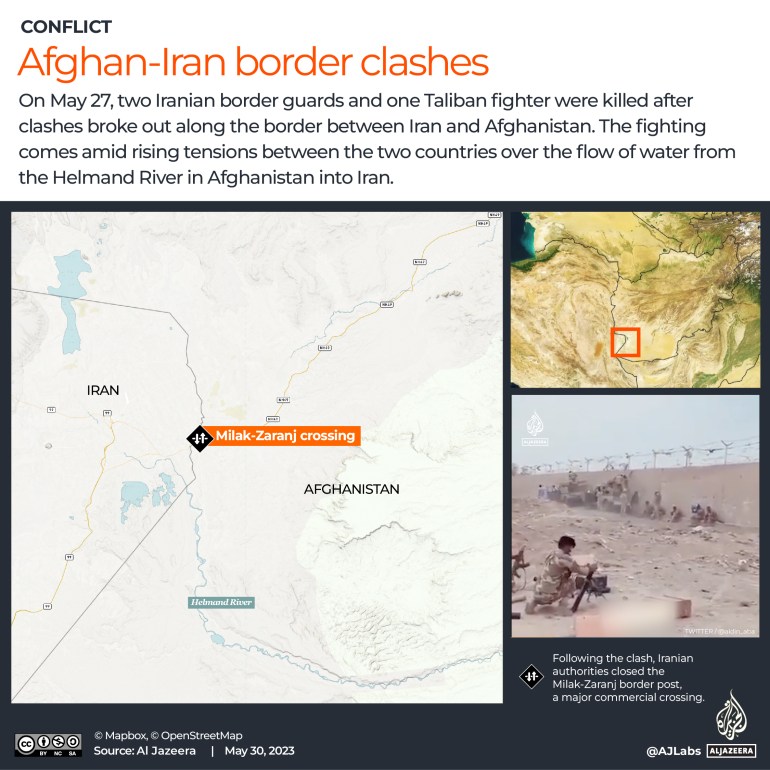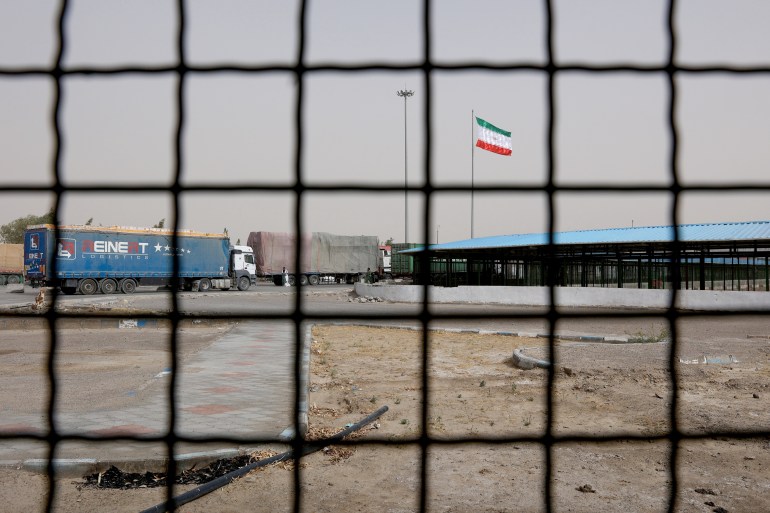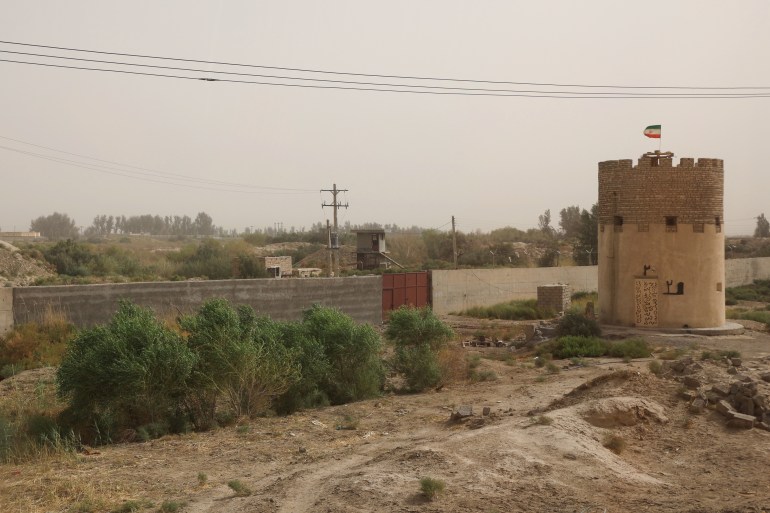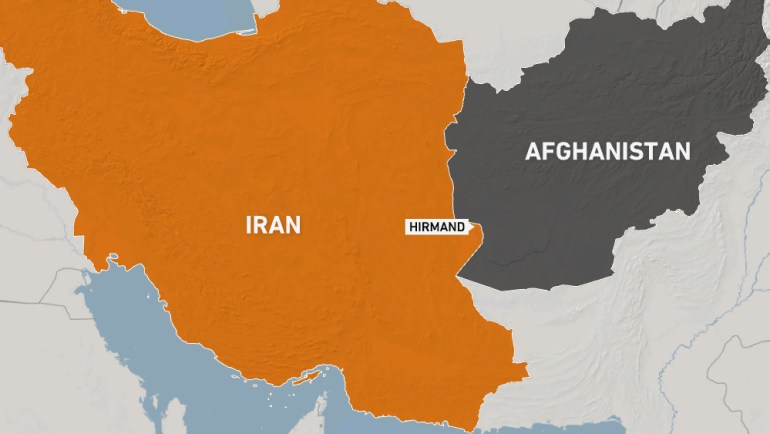Deadly clashes between safety forces on the Afghanistan-Iran border final week raised fears of a brand new battle.
Both sides have accused one another of beginning the taking pictures spree that killed not less than two Iranian and one Afghan safety guard. However, they issued a cautious assertion aimed toward calming the scenario.
The two sides have been in dispute for many years, regardless of a treaty on water sharing within the Helmand River in place since 1973. This river flows from Afghanistan to japanese Iran.
What induced the quarrel?
The causes for the clashes are nonetheless unclear, however the taking pictures incident at a border crossing between Afghanistan’s Nimroz province and Iran’s Sistan-Baluchistan province was the newest in a sequence of assaults by Iranian President Ebrahim Raisi earlier this month, when Afghan Taliban rulers This comes after Iran accused the nation of limiting the movement of water to japanese areas. It is in violation of the 1973 Convention.
“We is not going to permit the rights of our folks to be violated,” Raisi stated on May 18.
The Taliban has denied the costs however referred to as for “resolving the matter” in accordance with the treaty. The Taliban, who’ve remained diplomatically remoted since he took energy in August 2021, stated he wished “good relations” with Tehran.
According to Sheena Toosi, a non-resident senior fellow on the Center for International Policy (CIP), a US-based suppose tank, there’s a “lack of clear demarcation and understanding of border demarcations and guidelines” by Taliban fighters. It is alleged that there’s. Afghanistan in August 2021.
 (Al Jazeera)
(Al Jazeera)
Iranian officers have repeatedly accused the Taliban of ignoring worldwide regulation and border agreements since taking on Afghanistan two years in the past. Although there have been many clashes, there have been only a few casualties, and “misunderstandings” have at all times been blamed.
A day earlier than the border clashes, Iranian Foreign Minister Hossein Amirabdollahian referred to as on the Taliban to “adhere to the authorized framework” to resolve the water dispute.
“In current years, this treaty has not been revered by Afghanistan’s rulers, together with the Taliban,” CIP’s Toosi instructed Al Jazeera, including that Kabul had delivered solely “a fraction of the agreed quantity.”
“The scenario is additional exacerbated by the worsening drought scenario in Iran, making water points more and more vital,” he stated.
The Taliban issued an announcement saying they don’t need “fights with neighboring international locations.”
 The Iranian flag is painted on the Mirak border between Iran and Afghanistan. [File: Majid Asgaripour/WANA via Reuters]
The Iranian flag is painted on the Mirak border between Iran and Afghanistan. [File: Majid Asgaripour/WANA via Reuters]
What is the Afghanistan-Iran water battle?
The Helmand River, which is greater than 1,000 kilometers lengthy and flows throughout the border, has been dammed on the Afghan aspect to generate electrical energy and irrigate farmland.
Drought has been an issue in Iran for about 30 years, however it has worsened over the previous decade, based on the United Nations Food and Agriculture Organization (FAO). Iran’s Meteorological Organization says an estimated 97 % of the nation is presently going through a point of drought.
According to the Helmand Water Treaty signed by Afghanistan and Iran half a century in the past, Afghanistan is meant to share 850 million cubic meters of water from Helmand with Iran yearly.
It additionally calls on either side to deal with their variations by means of diplomatic channels and, failing that, by means of advisory committees headed by mutually chosen arbitrators.
Iran has repeatedly accused Afghanistan of non-compliance with the treaty and has opposed the nation’s choice to construct a dam on the river.
 Watchtower between Afghanistan and Iran at Mirak border crossing in Iran [File: Majid Asgaripour/WANA via Reuters]
Watchtower between Afghanistan and Iran at Mirak border crossing in Iran [File: Majid Asgaripour/WANA via Reuters]
How did the 2 international locations react to the battle?
Taliban leaders have referred to as for these points to be resolved “by means of diplomatic channels.”
“We don’t need relations with neighboring international locations to deteriorate. The Islamic Emirate of Afghanistan by no means helps escalation,” Foreign Ministry deputy spokesperson Hafiz Zia Ahmad instructed Saudi newspaper Arab News on Monday.
Meanwhile, Seyyed Rasoul Mousavi, head of Iran’s Foreign Ministry’s South Asia division, referred to as for avoiding battle as it might be detrimental to each international locations.
“If the peoples and elites of each international locations are smart, any type of battle will probably be strategically disadvantageous for each international locations,” he tweeted.
Analyst Tousi believes the border clashes have prompted either side to calm the scenario and “reaffirm their dedication to dialogue and cooperation.”
He stated there have been indicators that Iran was open to talks, provided that the Taliban’s deputy overseas minister met with Iranian envoys on the day of the conflict to debate water rights within the Helmand River.
 Hilmand District alongside the Iran-Afghanistan border [Al Jazeera]
Hilmand District alongside the Iran-Afghanistan border [Al Jazeera]
What is the connection between Afghanistan and Iran?
Toosi stated relations between the 2 international locations remained in a state of “uncertainty” as Kabul and Tehran “attempt to steadiness their pursuits and issues.”
Last week, after a video confirmed massive numbers of Taliban fighters approaching the border with Iran, he requested whether or not the Taliban had withdrawn their fighters from the border or whether or not they would honor the settlement sooner or later. It’s not clear,” he stated.
He stated water disputes between the 2 international locations are more likely to stay a “contentious difficulty” as each international locations face water shortage and growing water demand.
Furthermore, though Iran has held talks with the Taliban, it doesn’t formally acknowledge them as Afghanistan’s authentic rulers.
The Shiite-majority nation seeks the institution of an inclusive authorities that represents all Afghan ethnic and spiritual teams.
“Iran has expressed concern concerning the security and well-being of the Afghan folks, particularly the Shiite Hazara minority, who’ve confronted persecution and violence by the Taliban previously,” Toosi stated.


